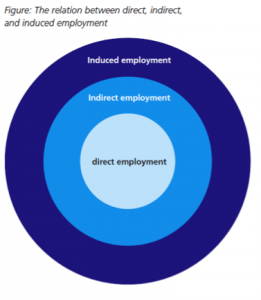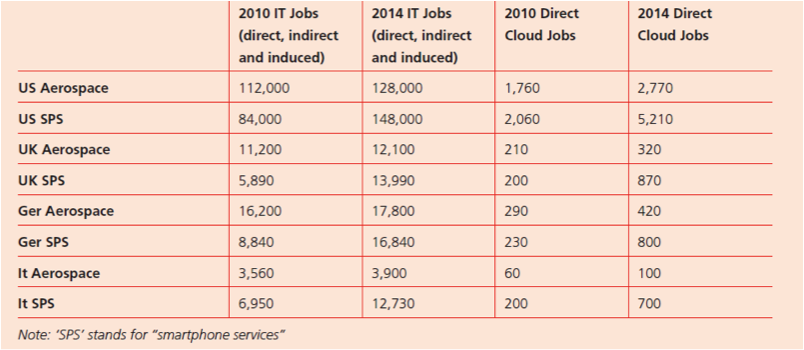
 It is commonly felt that cloud computing will bring changes to information handling practices with widespread effects on organizational structures and strategies. In this post, Jonathan Liebenau and Patrik Karrberg show how better models to assess the economic effects of cloud computing can provide concrete evidence of what is more or less likely to be those changes. The authors report the findings from a study that accounts, in detail, for the likely impact of cloud computing in major industrial and services sectors.
It is commonly felt that cloud computing will bring changes to information handling practices with widespread effects on organizational structures and strategies. In this post, Jonathan Liebenau and Patrik Karrberg show how better models to assess the economic effects of cloud computing can provide concrete evidence of what is more or less likely to be those changes. The authors report the findings from a study that accounts, in detail, for the likely impact of cloud computing in major industrial and services sectors.
The economic effects of cloud computing are presumed to be extensive, even transformative. The potential is evident: by providing mass access to expensive computing power and software, high capacity data storage and analysis, advanced infrastructure and other services, cloud providers can lower entry barriers to advanced ICT for all, whether small businesses, huge enterprises, educational and research establishments, or even individuals. The consequences are likely to be increased productivity and the genesis of new kinds of businesses and of improved business practices. Even if we subscribe to this optimistic scenario, the problem of measuring it has been a major challenge. Without a means to assess the likely effects of this new way of using ICT we cannot really know the scale of any likely transformation, or even if the aggregate effect might be positive or negative through trade effects, labour market disruptions, or governance problems.
Quantifying the Cloud
 While there have been many marketing and consulting reports on cloud computing, opinion surveys and even government-sponsored studies about the transition to cloud services, very few rigorous analysts have addressed the problem. The notable exception is Frederico Etro (2009). Some of the key economic features of cloud effects, however, have not been taken at all seriously enough. For example, the opportunity to move from capital expenditure to operating expenditures holds considerable implications for accounting and investment practices, taxation and the practices used to manage assets. The shift of work within firms from systems maintenance to higher level tasks holds implications for the labour market both in terms of displaced employees and skills demands. The opportunities to exploit services worldwide to achieve low prices challenges laws and practices about data handling of a variety of forms, especially those related to jurisdictional controls.
While there have been many marketing and consulting reports on cloud computing, opinion surveys and even government-sponsored studies about the transition to cloud services, very few rigorous analysts have addressed the problem. The notable exception is Frederico Etro (2009). Some of the key economic features of cloud effects, however, have not been taken at all seriously enough. For example, the opportunity to move from capital expenditure to operating expenditures holds considerable implications for accounting and investment practices, taxation and the practices used to manage assets. The shift of work within firms from systems maintenance to higher level tasks holds implications for the labour market both in terms of displaced employees and skills demands. The opportunities to exploit services worldwide to achieve low prices challenges laws and practices about data handling of a variety of forms, especially those related to jurisdictional controls.
Frederico Etro’s approach is to interpret the utility of cloud services in terms of an element of a production function and then calculating the systemic effects across a large number of sectors. He accounts for cloud computing as a general purpose technology and estimates possible impact on industry structure (small versus large firms) labour markets, and productivity. While this structures the problem in a valuable way, it produces results that must be presented as hugely variable because they cannot take into account sufficient detail about job tasks, sectoral features, specific investment trends, etc.
 Our approach has been to structure the problem from the bottom up, accounting for how particular, relevant tasks are performed by particular types of firms, which jobs will likely be displaced by firms divesting in capital equipment and which will be created by shifted responsibilities and new opportunities for spending. As these effects are highly localized, the growth rates of the sectors studied within their national contexts are especially pertinent. Underlying our analysis is an approach that considers not only the direct effects of cloud spending but also the indirect and induced employment impacts.
Our approach has been to structure the problem from the bottom up, accounting for how particular, relevant tasks are performed by particular types of firms, which jobs will likely be displaced by firms divesting in capital equipment and which will be created by shifted responsibilities and new opportunities for spending. As these effects are highly localized, the growth rates of the sectors studied within their national contexts are especially pertinent. Underlying our analysis is an approach that considers not only the direct effects of cloud spending but also the indirect and induced employment impacts.
These effects will differ according to other criteria, also, including the capabilities of particular firms and their current level of capital investment in IT, industry practices regarding replacement cycles, and the distribution of firms by size throughout the supply chain.
Cloud computing effects in two industries: smartphones and aerospace
So far, we have focused on the effects within the United States, the United Kingdom, Germany, Italy and Turkey of cloud computing in the aerospace and the smartphone services sectors (substituting automobile manufacturing for aerospace in Turkey). Within those sectors the use of cloud services is likely to be significantly different depending upon factors including the size of firms, the style of work and the cost of performing particular tasks. Our research presents the first effort to construct a dynamic model that accounts, in detail, for the likely impact of cloud computing in major industrial and services sectors. Here we can take into consideration how those sectors change and explain why the economic effects are likely to be different from country to country. We can also show how regulatory interventions, market trends or legal constraints might alter practices. The findings from our study shows how the microeconomic characteristics of cloud computing create a dynamic effect that will bring about changes that, when effectively implemented, will improve firm productivity, enhance new business development, and, while initially creating employment primarily in cloud services businesses and data centers, shift the character of work in many firms in the coming years. The chart below summarises our estimations of increasing IT and direct cloud employment in the two sectors:
Source: Liebenau et al (2012)
While the effects fall short of being dramatic, they do confirm that the employment outcomes are likely to be positive, creating more jobs than destroying. The knock-on consequences for small businesses are likely to enhance firm creation, albeit on a small scale.
Other areas and policy implications
Our interviews indicate that investors in new firms can annualise costs for IT into chunks that are easier to fit into a business plan. As cloud computing allows IT to be mapped into particular services for customers, this cost can be more accurately factored into the product price. The study demonstrates the effect of key areas of policy, also. Data transfer policies, having to do with either trade or concerns such as data security and privacy rights protection, can have significant effect upon regional implementations of cloud computing. Pricing of energy and the opportunity to affect pricing through the encouragement of green energy policies or other incentive mechanisms can make a major difference in a country’s ability to attract investment in data centres.
Further resources
A blog, webinar and further material on this can be found here.
Note: this blog post reports the findings from the report written by Liebenau, Jonathan and Kärrberg, Patrik and Grous, Alexander and Castro, Daniel (2012) “Modelling the Cloud. Employment effects in two exemplary sectors in The United States, the United Kingdom, Germany and Italy”, London School of Economics and Political Science, LSE Enterprise, London, UK. Sponsored by Microsoft.
Photo credit: kevin dooley via photopin cc
This article gives the views of the authors, and not the position of the London School of Economics.
We welcome your comments! Please take a look at our comments policy
_________________________________
About the authors
 Jonathan Liebenau – LSE Management Department
Jonathan Liebenau – LSE Management Department
Dr Jonathan Liebenau is a Reader in Technology Management, LSE. He Specializes in fundamental concepts of information, and the problems and prospects of ICT in economic development. Previously worked in academic administration, technology policy, and the economic history of science-based industry, all positions in which he has emphasised the use of information in organizations. He is the author or editor of a dozen books and over 70 other major publications. He has provided consultancy services to leading companies and strategic government agencies, including Dell, BT, IBM, Microsoft, TCS, Nortel, EDS, Lloyd Thompson, and in the UK Government, the Office of Science and Innovation, the Department of Trade and Industry and the Home Office.
 Patrik Karrberg – LSE Management Department. Dr Patrik Karrberg is a Research Fellow and program director for the Network Economy Forum within the LSE Department of Management. His research focuses on telecom service delivery innovation and converging industries in Asia and Europe.
Patrik Karrberg – LSE Management Department. Dr Patrik Karrberg is a Research Fellow and program director for the Network Economy Forum within the LSE Department of Management. His research focuses on telecom service delivery innovation and converging industries in Asia and Europe.








